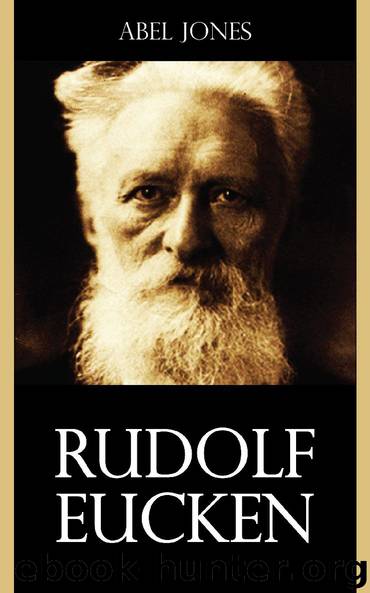Rudolf Eucken by Abel Jones

Author:Abel Jones
Language: eng
Format: epub
* * *
CHAPTER V THE “HIGH” AND THE “LOW”
EUCKEN MAKES THE RECOGNITION of the existence of a Universal Spiritual Life the starting-point of his constructive work. He takes up a position which he calls the nöological position. Many theories take up a materialistic position; they assert the reality of the material world, and endeavour to explain the world of matter as something independent of the human mind. Other theories assert the superiority of mind over matter, and endeavour to examine the mind as though it were independent of the material world. These two types of theories have been in continual conflict; the one has attempted to prove that thought is entirely conditioned by sense impressions received from the material world, the other regards the phenomena of nature as really nothing other than processes of the mind.
Eucken finds reality existing in the spiritual life, which while neither material nor merely mental, is superior to both, admits the existence (in a certain sense) of both, and does away with the opposition between the rival types of theories. Eucken does not minimise or ignore the existence of the natural world. The question for him is not the independent existence of the worlds of nature and mind—this he admits; he is concerned rather with the superiority of the spiritual life over the merely material and mental.
The natural life of man has been variously viewed in different ages. The writer of the Pentateuch described man as made in the image of God, and the natural man was exalted on this account. Some of the old Greek philosophers, too, found much in nature that was divine. Christianity took a different view of the matter—it exalted the spirit, and emphasised the baseness of the material. The growth of the sciences made man again a mere tool of laws and methods, but it considered matter as superior to mind, mind being entirely dependent upon impressions received from matter. The question continually recurs—which is the high, which is the low? Shall nature triumph over spirit, or spirit over nature?
Pantheism replies to the question by denying that there is anything high as distinguished from the low. There is but one; and that one—the whole universe—is God. There is no evil in the world, says pantheism, everything is good—if we could understand things as they really are we should find no oppositions in the universe, and no contradictions in the nature of things. The world as it is, is the best of all possible worlds—there is perfect harmony, though we fail to appreciate it. Other optimistic theories, too, deny the existence of evil and pain, and try to explain our ideas of sin to be mere “points of view.” If we could see the whole, they tell us, we should see how the parts harmonise, but now we only see some of the parts and fail to appreciate the harmony. In this way they try to explain away as unreal the phenomena of evil and pain.
But Eucken has no patience with such theories.
Download
This site does not store any files on its server. We only index and link to content provided by other sites. Please contact the content providers to delete copyright contents if any and email us, we'll remove relevant links or contents immediately.
The remains of the day by Kazuo Ishiguro(8999)
Tools of Titans by Timothy Ferriss(8396)
Giovanni's Room by James Baldwin(7346)
The Black Swan by Nassim Nicholas Taleb(7129)
Inner Engineering: A Yogi's Guide to Joy by Sadhguru(6795)
The Way of Zen by Alan W. Watts(6614)
The Power of Now: A Guide to Spiritual Enlightenment by Eckhart Tolle(5781)
Asking the Right Questions: A Guide to Critical Thinking by M. Neil Browne & Stuart M. Keeley(5775)
The Six Wives Of Henry VIII (WOMEN IN HISTORY) by Fraser Antonia(5515)
Astrophysics for People in a Hurry by Neil DeGrasse Tyson(5190)
Housekeeping by Marilynne Robinson(4447)
12 Rules for Life by Jordan B. Peterson(4304)
Ikigai by Héctor García & Francesc Miralles(4274)
Double Down (Diary of a Wimpy Kid Book 11) by Jeff Kinney(4272)
The Ethical Slut by Janet W. Hardy(4253)
Skin in the Game by Nassim Nicholas Taleb(4248)
The Art of Happiness by The Dalai Lama(4130)
Skin in the Game: Hidden Asymmetries in Daily Life by Nassim Nicholas Taleb(4007)
Walking by Henry David Thoreau(3962)
